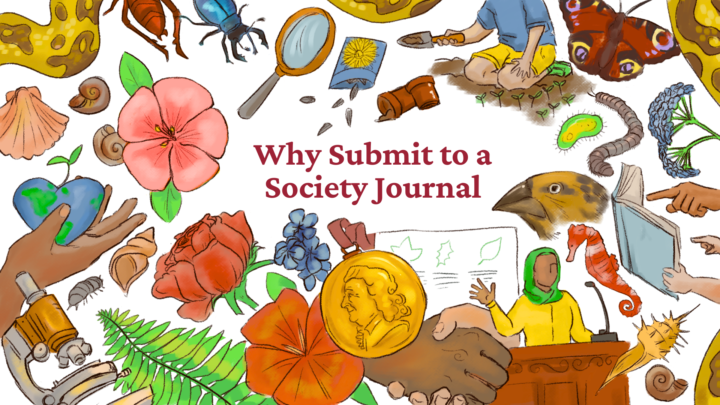Investing in our Community
How publishing with our journals gives back to The Society
The Linnean Society is committed to publishing high-quality and ground breaking scientific research across the four themes of botany, zoology, biology and evolution. We strive to make the work published in our journals accessible and engaging to a global audience.
As a not-for-profit organisation, the income generated from our journals is used to fund our charitable endeavours and community engagement. Most notably this is through our historical collections, extensive education and events programmes, and our prestigious medals, prizes and awards.
Our mission is to cultivate a community working for a world where nature is understood, valued and protected, and we are dedicated to achieving this through:
- Hosting regular natural history-focused events both in-person and online.
- Offering education workshops and resources to primary and secondary schools, as well as funding several grants across science and education.
- Recognising excellence in the study of natural history with our nine prestigious medals, prizes and awards.
- Maintaining and sharing our Arts Council England Designated collections, including those of renowned Swedish naturalist Carl Linnaeus, to attract researchers that continue the ground-breaking work begun in 1788.
Publishing with Purpose
We reinvest back into our journals through our expert Editorial Office, ensuring an expedited and high-quality peer review process. Additionally, we promote authors’ work and showcase the research we publish through blogs, online lectures, and in-person events in our historic building.
We thank all those who support us in achieving our mission. Without our authors, Editors-in-Chief, Editorial Boards, reviewers and our Publishers; Oxford University Press, we would not be able to support our charitable work.

Supporting our Authors
Medals and Awards
The Society offers four awards per year for doctoral theses published in one our of Linnean Society journals, celebrating early career researchers in the fields of botany, biology, evolution and zoology.
Two prizes of £500 and a piece of fine art for the best doctoral thesis in botany (algae, fungi or plants), as judged by a paper published in the Linnean Society journals.
Professor Irene Manton was a botanist noted for her study, using electron microscopy, of ferns and algae. She was a lifetime Fellow of the Linnean Society and its first female President, serving from 1973 until 1976. The prize is awarded annually in Professor Manton’s memory and recognises outstanding theses in botany examined for a doctorate of philosophy, as judged by a paper published in one of the Linnean Society's journals. It is open to papers contributing to a PhD thesis and published with the PhD student as first author. Find out more and read the eligibility criteria before submitting.
Two prizes of £500 and a medal awarded for the best doctoral thesis in biology covering areas other than botany (algae, fungi or plants), as judged by a paper published in the Linnean Society journals.
Dr John C. Marsden was the Executive Secretary of the Society from 1989 until 2004 and was elected as a Fellow honoris causa in 2005 in recognition of his services to the Society. The medal is awarded annually in Dr John C. Marsden's memory and awards the best thesis as judged by a paper published in one of the Linnean Society's journals. It is open to papers contributing to a PhD thesis, and published with the PhD student as first author. Find out more and read the eligibility criteria before submitting.
Promoting your Research
The Society works with authors to highlight their research through social media, events and our journal blog The Paper Trail. Our aim is to share your research with our global membership and the wider scientific community, supporting scientists at every stage of their career.
The Paper Trail

We promote research published in our journals through our blog series The Paper Trail where high impact papers are condensed into short, plain language blogs. We aim to increase the reach and accessibility of our renowned and international journal papers, encouraging the public and early career researchers to read and submit. We also aim to increase the awareness of our journals and continue to act as a place of important discussion.
We actively encourage young scientists and early career researchers to volunteer as Guest Bloggers, ranging from university graduates and post-doctoral students to professional ecologists and species surveyors. We recognise that science communication is a critical skill and is necessary to engage with and inform the wider public not only about current research but the state of the natural world.
Want to contribute to our blog, or keen to have your paper featured? Email the respective journal inbox, clearly stating your interest in the subject line, or contact the Journal Officer directly.
Events
Our events programme frequently features research published in our journals. This includes our regular lunchtime lecture series, where speakers from around the world give a 30-minute online-only talk about their research. We also host Day Meetings once a year, related to special issues published in our journals. You can watch some of our previous lectures on our YouTube channel.
Our Membership Magazine
Our membership magazine The Linnean also features articles related to our journals. Produced three times a year, the magazine updates our members with the latest news and events from the Society, as well as providing short articles on the scientific research of our members, affiliates and collaborators, and the history of science, with particular links to our Fellows and collections.
